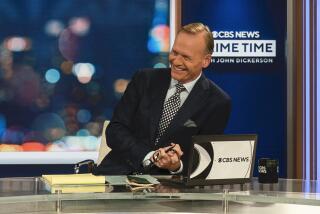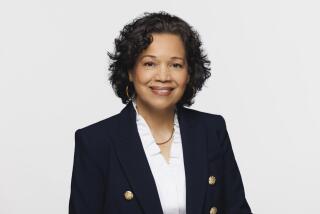CNN Could Learn a Few Things From Good Old Auntie Beeb
- Share via
Howard Rosenberg is right to pillory CNN in its recent attempts to create a cult of personality around their news anchors, abandoning the belief that news is sacred--not the people who deliver it (“Big Names, Little News--This is CNN?” Feb. 1).
Has CNN sold out to its network news rivals? Yup. Are they conning the American public into believing that news is only palatable coming from the lips of a vastly paid, coiffed and hair-sprayed celebrity? Yup. Is it avoidable? Ask Auntie Beeb.
Imagine a TV world where it isn’t the news anchor that matters most, but the quality of the news coverage. Imagine a news network so trusted around the world that people of all nationalities listen in on radio and television because they believe what they’re hearing is true. Imagine newsrooms where the producers and reporters--not the on-air anchor--decide what goes on air.
Where the journalist will never be told that a story of public interest can’t be covered because it might offend one demographic group or another, risking a dip in ratings. Where the decision on what to cover is based on what the public should know as informed citizens--not on what executives think the public wants to hear, based on ratings and focus groups.
This news nirvana isn’t myth. It really exists. I speak as the only American ever to anchor the news for the BBC. I was one of the faces of BBC World, Britain’s international news channel and antidote to CNN.
At the BBC--or, as the British affectionately call it, Auntie Beeb--cults of personality are distinctly frowned upon, almost to the point of absurdity. As a previous anchor for CNBC and correspondent for NBC, I was “de-glammed” by my BBC minders--big “American” hair trimmed down, Technicolor jackets reduced to easy-on-the-eye pastels.
It was a shock. I became a senior citizen overnight. The BBC didn’t care if the lighting made me look 30 years older, or that I was sitting in shadow, or that my hair was sticking up. They didn’t blow a gasket when the script printer ran out of paper, or even when, in true public broadcasting tradition, power cuts knocked out my TelePrompTer. This was news anchoring by the seat of my pants (knickers), where every wit I possessed was pulled out of me, and broadcast live to the world.
I loved it. Never in my experience working for an American network was I allowed the freedom to do what I was trained for. Yes, I was downsized as a news personality. To be the face of the BBC meant just that: I was the mouthpiece for a revered news organization-cum-national institution. The only unique stamp allowed me was my accent. Even there, the BBC’s language police did their best to neutralize any of my more objectionable pronunciations (I was not to use the American pronunciation “Mooslim”; this, I was told, was the same word as “camel”). Thankfully, my minders never worked out that I was really a Valley girl. Eliza Doolittle had it easier.
My BBC bosses did care about my ability to conduct a live interview fairly and objectively, whatever country was involved. With only a minute’s notice, unbriefed, I was expected to interview newsmakers around the world with the expertise of a think-tank specialist.
As a former foreign news producer with a doctorate in international relations, this wasn’t insurmountable. But it was fraught with peril. I came close to losing my job over an interview I did on the Indian elections. A viewer in New Delhi complained that, by the way I’d phrased a question, I had expressed a preference for one of the candidates. Auntie Beeb deemed me guilty until proven innocent--which I later was.
As my career flashed in front of me, I learned all too quickly what mattered most at the BBC: journalism, not celebrity.
I mourn with you, Howard, the sell-out by CNN. But I can tell you, I’ve seen the news messiah. And he’s a she.
*
Carla Garapedian was a news anchor for BBC World from 1996 to 1998. A resident of London, she now produces and directs documentaries for the United Kingdom’s Channel 4.
More to Read
The biggest entertainment stories
Get our big stories about Hollywood, film, television, music, arts, culture and more right in your inbox as soon as they publish.
You may occasionally receive promotional content from the Los Angeles Times.










